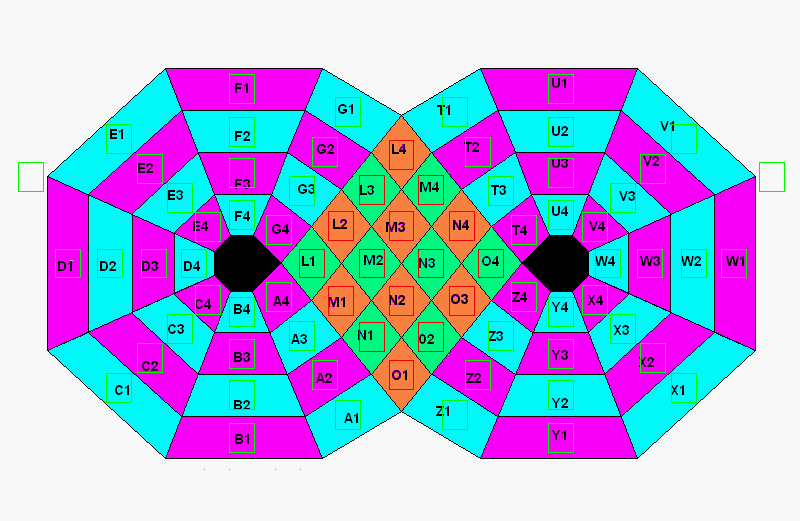Lemniscate Chess
Lemniscate Chess is played on a 72-cell board in the shape of an infinity symbol, otherwise known as a lemniscate. It is inspired by Infinite Chess, invented by Mark Colebank in 1997. I loved Infinite Chess, but thought there was room for improvement in the placing and movement capability of the Pawns. Because the Infinite Chess game is proprietary, I realized that I would have to change more than just the pawns in order to make what I could present as a game of my own. Besides the Pawn modifications, I have customized the promotion rules and checkmate rules, added several new pieces, and renumbered the board in a way that is (to me) more user-friendly.
 Figure 0: The cells and their numbering
Figure 0: The cells and their numbering
Setup
WHITE:Pawn - b1, b2, b3, b4, f1, f2, f3, f4 Rook - c1, e4 Knight - c2, e3 Bishop - c3, e2 Crown Prince - e1 King - c4 Queen - d4 Empress - d3 Princess - d2 Crusader - d1
BLACK:
Pawn - u1, u2, u3, u4, y1, y2, y3, y4 Rook - v1, x4 Knight - v2, x3 Bishop - v3, x2 Crown Prince - x1 King - v4 Queen - w4 Empress - w3 Princess - w2 Crusader - w1
N.B. These settings are for the default version. The Zillions of Games file includes a variant with different settings.
Pieces
Each player has :1 King - the royal piece. As in FIDE chess, it moves one square in any direction to a safe square. It is immobilized if attacked: a check must be relieved in some other way, such as by blocking the line of attack or by capturing the attacker. 1 Crown Prince - moves as a King, but is not royal. 1 Queen - a Rook-Bishop compound, as in FIDE chess. 1 Empress - a Rook-Knight compound. 1 Princess - a Bishop-Knight compound. 1 Crusader - a King-Knight compound (not royal). 2 Rooks - move in loops or along radial files. 2 Bishops - move on diagonals. 2 Knights - move one step orthogonally followed by one step diagonally, or vice versa. 8 Pawns - as in FIDE chess, move passively forward orthogonally, capture diagonally. On its initial move, a Pawn may move one, two, or three steps, but is subsequently limited to one. There is no en passant capture. On reaching the enemy zone, it promotes to Steward.
White Pawns move in a Southwest-Northeast or a Northwest-Southeast direction (the latter are shown upside down, for clarity). Black Pawns similarly move in a Southeast-Northwest or a Northeast-Southwest direction (again, the latter are shown upside down).
* Steward - a promotion piece (see above). It moves passively one step in any orthogonal direction, and captures one step away in any diagonal direction.
 Figure 2 - showing the pieces and their names.
Figure 2 - showing the pieces and their names.
Rules
As in FIDE Chess, the object of the game is to checkmate the opponent. A stalemate also counts as a win in Zillions; in tournament play, a stalemate will count as an inferior win - with a half-point awarded only to the player causing the stalemate.The King is immobilized if in check. I decided on this rule after play testing with zillions - I found that on boards with a round shape, forcing checkmate is notoriously difficult. As I personally do not like drawish games, I thought some restrictions on the King, which do not distort his basic character, would be in order.
Notes
Zillions estimates that the pieces have the following values :Queen - 31621 (26.6 pawns) Empress - 30378 (25.5 pawns) Rook - 24153 (20.3 pawns) Crusader - 16508 (13.9 pawns) Princess - 14317 (12.0 pawns) Crown Prince - 9821 (8.3 pawns) Bishop - 8121 (6.8 pawns) Knight - 6705 (5.6 pawns) Steward - 4184 (3.5 pawns) Pawn - 1190
It will be seen that owing to the shape of the board, the Rook - and the compound pieces of which the Rook is a part (Queen and Empress) - has been considerably boosted in value. The Bishop and Knight, although stronger than in FIDE (relative to the pawn), are much weaker in this game relative to the Rook and its compounds.
 I have programmed a Zillions of Games file to play this game. You may
download it here. You need the Zillions of Games engine installed to play it.
I have programmed a Zillions of Games file to play this game. You may
download it here. You need the Zillions of Games engine installed to play it.
* Free distribution of this game is permitted - and, in fact, encouraged - for any noncommercial purpose.
* You have Zillions experience? Feel free to optimise the code, correct any bugs, create variants for this game, or even use ideas (including code) from this program in games of your own. You may email me
with suggestions. If I use your suggestions in future editions, I will acknowledge you. This 'user submitted' page is a collaboration between the posting user and the Chess Variant Pages. Registered contributors to the Chess Variant Pages have the ability to post their own works, subject to review and editing by the Chess Variant Pages Editorial Staff.
This 'user submitted' page is a collaboration between the posting user and the Chess Variant Pages. Registered contributors to the Chess Variant Pages have the ability to post their own works, subject to review and editing by the Chess Variant Pages Editorial Staff.
By David Cannon.
Web page created: 2009-12-15. Web page last updated: 2009-12-15
 Figure 1: Initial setup
Figure 1: Initial setup